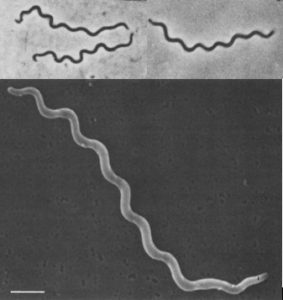FOR IMMEDIATE RELEASE:
July 27, 2022
Media contact:
Jill Sirko, jsirko@forsyth.org
Cambridge, Mass. – Bruce Paster PhD, a Senior Faculty member of the Forsyth Institute and Professor of Oral Medicine, Infection, and Immunity at the Harvard School of Dental Medicine, was recently honored for his lifetime of work on spirochetes by having a genus named after him in a recent publication that analyzed this and other spirochetes.
The description of the new genus reads: “Description of Brucepastera gen. nov. Etymology: Bruce.pas’te.ra. N.L. fem. n. Brucepastera, named after the American microbiologist Bruce J. Paster, in recognition of his important contributions to the study of spirochetes.”
Brucepastera parasyntrophica was isolated from the intestinal contents of cockroaches.
Dr. Paster has devoted much of his life to studying spirochetes. “My research dealt with spirochetes from all environments, including the human oral cavity, cockroach and termite guts, cow, pig and mouse intestines, and even digestive tracts of oysters.” Dr. Paster said.
His fascination began in graduate school, and his PhD dissertation, “Ecology of rumen spirochetes,” appeared in 1981. Since then, he has given a dozen talks and posters at international meetings, written over 20 papers/reviews and 20 book chapters, and had 2 NIH grants – all on spirochetes.
“Bruce is the godfather of oral spirochete research,” Dr. Wenyuan Shi, CEO of the Forsyth Institute said. “Forsyth is pleased to have yet another Faculty member with a microorganism named after them. It speaks to the strength of our microbiology program.”
Spirochetes are microorganisms that have a corkscrew shape and are unique among bacteria for being able to move through tissue and other viscous environments. When they are found in humans, spirochetes tend to cause disease such as Lyme disease and syphilis. Most interesting for Forsyth, spirochetes of the genus Treponema are often associated with chronic periodontal disease. Dr. Paster also found spirochetes of the genus Borrelia that may be associated with Alzheimer’s disease.

In humans, spirochetes typically show up where there is inflammation. It is unclear whether the bacteria are causing the inflammation or if the inflammation causes the bacteria to proliferate. In some environments, like cockroach and termite guts, spirochetes are often responsible for keeping a favorable equilibrium.
In addition to the genus Brucepastera, Dr. Paster also has the species Porphyromonas pasteri named after him. This species has been shown to be associated with periodontal disease.
About the Forsyth Institute
The Forsyth Institute, founded in 1910, is the world’s leading independent research institution focused on oral health and its connection to overall wellness. Forsyth was founded as a pediatric dental hospital serving disadvantaged children in the Boston area. Today, the Institute is grounded in a 3-pillared strategic plan focused on biological research, clinical service and public health outreach, and technological innovation. Forsyth carries out its original mission through a mobile public health dental program called ForsythKids.
